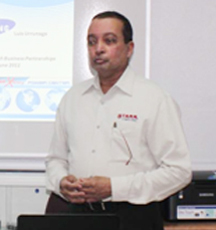By Mike Mohan
Mike Mohan is the Chief Executive
Officer of Starr Computers
However much we might pretend to the contrary, security is everybody’s business.
Government and private sector alike have been paying attention to security-related issues, particularly given evidence of vulnerability of the business sector to crime.
The challenge of combatting the scourge of crime continues to be a formidable one, but there is evidence that sound strategies for bringing the problem under control can evolve out of public/private sector partnerships.

Setting aside the imperative of citizen security, crime has come to be inextricably linked to the economic well-being of Guyana. Over time, Guyana has become a highly visible emerging economy and a place of considerable interest for international investors. It is hardly by accident that multi-million-dollar investments in oil and gas, forestry and gold are unfolding simultaneously in Guyana. The sheer scale of the economic potential that reposes in this level of investor interest is more than sufficient incentive for the creation of renewed interest in a compact between the government and the citizenry, including the private sector, to enhance security.
It is no secret that in societies where crime flourishes without any serious evidence of a robust official response, international investment is stunted. More than that, escalating crime triggers continual waves of migration, often of the most highly-qualified and skilled sections of the work force. Guyana has had its own experience of these phenomena.
I believe that we have reached a stage in our development where effective security must be factored into the country’s development plan. Collaborative work between and among stakeholders in the public sector that take account of the considerable technological support that is currently available on the local market can go a significant way towards solving the problem.
It will be recalled that while the recent economic downturn in North America and Europe necessitated significant cuts in security budgets, the business community continued to benefit from efficient and effective security. The reason? There was strong security infrastructure in place in the first place. Here, the secret reposes in striking the correct balance between detachments of guards and electronic security management applications.
There is, in my view—and I suspect in the view of several other Guyanese businessmen and women—a strong case for the reduction of taxes on some categories of security equipment. In much the same manner that tax concessions in the IT sector precipitated an opening of the floodgates in terms of computer literacy and expansion of the local IT landscape, so too will reduced taxes trigger increased business and domestic sector investment in security.
Currently, duties accrued on security and surveillance solutions imported into Guyana range from 25% to 30% on landed cost, a situation that places electronics security beyond the reach of small and medium-size businesses. A signification reduction on taxes and duties on electronic security solutions could significantly reduce the vulnerability of both domestic homes and business premises.
More than that, the popularisation of electronic security creates stronger linkages between the police and the citizenry since it facilitates collaboration in the acquisition of recorded data.
Posters can be generated from recorded footage resulting, arguably, in an increased level of arrests. Affordable surveillance installations also generate additional employment and raise the levels of technical skills in the society.
Over the years, my own company, Starr Computers, has been monitoring the halting strides of the local business community towards the incremental acceptance of electronic security, not as a replacement for security guards but as an additional layer of protection that serves other more important purposes including that of an early warning system and the leaving behind by criminals of electronic footprints that lead to early detection. From my own vantage point in the USA, I have been able to monitor the rapid evolution of several generations of electronic security systems each, in some instances, more sophisticated than the previous one. Not least among the things we have learnt is that security technology is adaptable to differing needs and costs could vary depending on the type of business that is being secured.
We have learnt too that it is not enough to simply invest in the mass marketing of brands and reputations without being able to persuade consumers about the effectiveness of the security product. Accordingly, our approach has been to work with the most reputable companies and brands, bringing their representatives to Guyana and ensuring that our own technicians are familiar with the products and the manner in which they are applied. Our investments have also included the acquisition of distributorships for various reputable security products.
We believe that the time has come to up the ante as far as electronic security is concerned. That is why trained personnel will be visiting with us next month to begin work on more advanced methods, including by biometrics, facial and fingreprint access.
More affordable security surveillance equipment will also open up new and lucrative employment opportunities in the installation and servicing sub-sectors, a development which will, in effect, significantly enhance the level of technical education. Of course, it goes without saying that installed surveillance, even on its own, can serve as a significant deterrent to criminals.
Arising out of discussions with technical staff, Starr Computers has designated March and April ‘Security Months.’ During this period we shall be seeking to raise awareness about the importance of security solutions by providing demonstrations and workshops to customers and visitors to our Brickdam complex.
Our goal in the period ahead is to support the rest of the private sector and the public sector in helping to provide responses to the security challenges confronting Guyana and, in the process, rendering homes and business premises safer and enhancing the comfort level of the citizenry. It is, we believe, a more than worthwhile investment.




